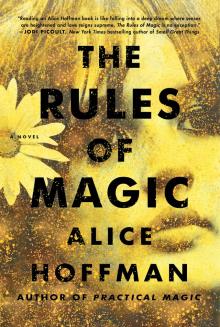- Home
- Alice Hoffman
Local Girls Page 5
Local Girls Read online
Page 5
How to Talk to the Dead
Two days after Gretel Samuelson’s grandmother moved in with them, Gretel discovered her down on her knees in the kitchen, looking up past the chandelier, as though she could see through the ceiling, right into heaven. To get a true cleanliness fanatic like Grandma Frieda onto a floor which hadn’t been mopped for a month was some sort of inverted miracle in itself. Usually, Frieda would have attacked the sticky traces of jelly and tomato sauce with Lestoil and a scrub brush. Now, she didn’t even seem to notice the dirt. Right away Gretel thought, Heart attack. She thought, Stroke. She thought, I really cannot go through any more sorrow.
The truth was, Gretel had become cynical and snappish. Her family had fallen apart, and Gretel had too. She’d started to chew her cuticles until they bled. She smoked too much; she was unable to sleep. She had come to believe there were little stones in her veins where the blood used to be, hard, cold things that rattled and rolled whenever any real emotion was called for.
On the day when her grandmother spoke to heaven, Gretel had been wasting time as usual, sneaking cigarettes out behind a large catalpa tree and feeling sorrier for herself than any person has a right to. As soon as she walked through the back door to find her eighty-four-year-old grandmother kneeling on the linoleum, Gretel knew something was seriously wrong. She could feel the stones inside her hit against each other.
“Grandma?” Gretel said.
Frieda’s mouth was moving a mile a minute, but no sound escaped. This was not a woman who wished to engage in idle conversation. All the same, Gretel took a step closer. “Are you trying to say something?” she asked.
Gretel’s grandmother waved one hand in the air and didn’t bother to answer. She loved her granddaughter dearly, but Frieda did not like to be interrupted, especially while she was making a deal with the powers that be. This was the sort of bargain you make only once in a lifetime. The deal was simple and pulled no punches; there were no fancy addenda, no clauses, no strings of any kind. All Frieda was asking for was her daughter’s life in exchange for her own. Her daughter, Frances, was supposedly cancer-free since her last operation, but Frieda never had trusted doctors. You wanted something done, you had to do it yourself.
Frieda got up off her knees, refusing her granddaughter’s offer of help. Immediately, she began to get ready to die. First, she reached into her pocket and pulled out a twenty.
“Get a pizza,” she told her granddaughter, a nice girl in spite of her gloomy attitude. “Bring me the change.”
“You get sick when you eat pizza,” Gretel reminded her grandmother.
“Watch and see.” Frieda wagged a finger as if to suggest that Gretel still had a whole lot to learn.
Gretel went to her mother’s bedroom and knocked on the door. They’d moved the TV inside and Frances was sitting up in bed, watching a movie about true love and crying. Frankly, Frances had a lot to cry about. Whenever she thought about her ex-husband, she was brought to tears. She had even gone to a hypnotist in Brooklyn to remove his betrayal from her mind, but by the time she was walking back to her parked car, she was already imagining her ex and his new wife picking out furniture for their house.
Franny, her ex had always said with a sigh when she was the one who wanted anything. You know we can’t afford that.
But, as it turned out, he could afford plenty, although that didn’t change the fact that there still wasn’t a decent piece of furniture in the house he’d left behind. Frances knew it was all worthless; on the day Sam left she’d called the Salvation Army, hoping to get rid of everything they had owned together, but the pickup guys had refused to accept the living room suite. Too worn, they’d said. Too ratty and beat-up.
“Grandma wants me to get her a pizza,” Gretel threw herself down across the foot of her mother’s bed. “I think she’s lost her marbles.”
“Is she cleaning?” Usually, the house was enough of a mess to keep Frieda busy and out of everyone’s hair.
“Nope. She’s not even vacuuming. She’s just talking to the ceiling and asking for pizza.”
Frances took a sip of water and considered. She’d lost weight, and her right side, where they’d operated, still felt weak. In the last few months, she’d had a lot of time to consider the state of mankind, and she’d decided that people actually had very few choices in their lives. Most things happened to you. Most things rolled right over you and then kept on going.
“Get her the pizza, if that’s what she wants,” Frances told Gretel. “Let her enjoy herself.”
That night, Gretel’s grandmother had a terrible case of indigestion, but she didn’t care. Her doctor had warned her not to have salt, sugar, fat, MSG, Tabasco, wine, spices, or anything cooked in oil. But the following day, when Gretel came home from school, Frieda was waiting for her with the menu from the Chinese take-out place up on the turnpike, a place called Ho Ho’s known for its especially hot, oily food. It was years since Frieda had last tasted three-spice chicken, and nearly a decade since she’d dared to order barbecued spareribs.
“You’re kidding, right?” Gretel said when her grandmother handed over the menu.
“Make sure to get a few extra packets of soy sauce,” Frieda said. “They’ll give you plenty if you ask.”
“This is some kind of suicide thing. That’s what it is!” Gretel saw the whole picture clearly now: food used as a weapon. Grease and spice aimed directly at the heart and arteries. “Well, I’m not going to participate, Grandma, so don’t ask me.”
“Fine.” Frieda had faced down a lot tougher customers than her little pip-squeak granddaughter. Who had called her son-in-law a liar right to his face when he said he couldn’t afford to pay child support? Who had taken a cab out to his fancy new house when the checks were late? “If you don’t want to go, fine. They deliver.”
That night they all sat on the edge of Frances’s bed, with plates of Chinese food on their knees. There was an old movie on, Now, Voyager, and Gretel and her mother were both crying so hard they could hardly chew. Gretel’s brother, Jason, who continued to be less verbal and more handsome—as if the two traits were genetically linked—rolled his eyes as he finished up the spareribs.
Grandma Frieda nudged Jason. “They think crying’s going to get them someplace. It’s not going to get you anyplace,” she told her daughter and granddaughter.
“Oh, Mom.” Frances put down her dinner plate. She couldn’t take her eyes off Bette Davis. She couldn’t stop thinking about the man who’d abandoned her. “Leave us alone.”
“Never,” Grandma Frieda said.
As it turned out, the Chinese food seemed to have no ill effects on Frieda’s digestive system. The following day she took off to Atlantic City with her canasta-playing cronies to see if they could make a killing at the Tri-State Championships. They went once a year, and although they hadn’t made a killing yet, they still had hope.
When the time came, Gretel went out to the front stoop to wait for the taxi that would take her grandmother to the bus station.
“Don’t you have a suitcase?” she asked when Frieda came out of the house with only a purse.
“Who needs the extra baggage?” The taxi was approaching and Frieda signaled wildly to the driver, even though there were no other people on the street. “Listen, honey,” she said to Gretel just before she got into the cab. “I’m not really leaving you.” Facts were facts—Gretel was her favorite, and there were tears in Frieda’s eyes.
“You think crying’s going to get you someplace?” Gretel teased.
She hugged her grandmother and stood out on the curb so she could wave goodbye. She waved and she waved until she couldn’t see the taxi anymore; then she sat down on the edge of the curb and cried.
Frieda died that night at the Copper Penny Motel, the place where she and her girlfriends always stayed in Atlantic City, since the rooms were clean and breakfast was free—a bagel, eggs any way you liked them, and what the management vowed was fresh-squeezed orange juice. On the even
ing when she died, all the canasta cronies had gone to a Hungarian restaurant, and Frieda’s friends wondered if it was the chicken Paprikash that had done her in, although the official coroner’s report suggested that Frieda had a congenital heart defect—it had simply taken eighty-odd years to affect her.
Now when Gretel came home from school in the afternoons, she locked herself in her room. There were times when nothing seemed to matter, and this appeared to be one of them. A girl had to care if she was to comb her hair, eat a decent meal, wash her face with Ivory soap. Gretel no longer gave a damn about any of it. What was life anyway? Only a continuous vale of sadness and tears. Such were the thoughts she was entertaining, and perhaps this is why Gretel began to fade. She grew paler and paler until you couldn’t quite distinguish her form when she leaned against a white wall. Frances became truly alarmed. At last she telephoned her ex and demanded he do something.
“What can I do?” Sam said, always the same sad song. “Gretel’s been incorrigible from day one.”
“Listen, mister, you can do plenty. Offer to send her on a trip. Buy her a new wardrobe. Invite her to your house for dinner.”
After she slammed down the phone, Frances felt elated. She didn’t think about her ex once that night; she didn’t shed a tear. Frankly, it pleased her that she had sounded so much like Frieda all the while she’d been shouting at that self-centered loser. Naturally, of all Frances’s suggestions, Sam chose the dinner invitation. What did it cost him? Two extra steaks thrown on the broiler? Another head of lettuce added to the salad? On the designated evening, Jason drove Frances’s car, a rusty Ford with the rear end smashed in. As they neared the North Shore, the houses seemed bigger with every block. They kept the windows rolled down; all the same they couldn’t seem to get enough air.
“We’ll eat and we’ll split,” Jason said. “In and out.”
“Yeah, yeah,” Gretel said. Now she knew what people meant when they said they were in the grip of depression. She was in the grip, all right, and it was holding her tight. “Whatever.”
“A total of forty-five minutes.” Every time he spoke, the skin beneath Jason’s left eye twitched. It was subtle, but if you looked closely you could see his discomfort, clear as day. “Fifty minutes tops. We’re polite, we let the old man drop some cash on us, and we’re gone.”
They left their mother’s car parked beneath a white birch tree, and walked across the lawn. It was November, that quiet, gray time of the year when you feel like holding someone’s hand. Gretel had her own hands clasped together, like a corpse. Jason kept his hands in his pockets. The house really was huge, and maybe that was why it took so long for anyone to come to the front door.
“Fuck it, it’s freezing out here,” Jason said.
“Ashes to ashes,” Gretel said.
“Will you cut it out?” Jason put his hand on the door-bell and left it there. “Everybody dies, Gret. Fact of life.”
“Is that supposed to cheer me up?” Gretel asked. “Because somehow it just doesn’t.”
It was Thea who answered the door. She always seemed vaguely distraught to come face-to-face with Gretel and Jason, as if their very existence made the world a shakier place.
“Right on time,” Thea said.
Actually, they were twenty minutes late, but who was counting? So what if the steaks were a little dry and the salad wilted? Gretel and Jason followed their father’s new wife through the front hall, toward the dining room. There were good carpets on every floor and the furniture was highly polished.
“She’s getting fat,” Gretel whispered to her brother when they stopped beside the closet to take off their coats. “Look at her.”
Jason glanced over his shoulder, then shrugged. “She seems the same to me.”
Females over the age of nineteen never really entered his field of vision, but when their father came to join them in the dining room, even Jason noticed that he’d gained weight. Maybe his new bulk was what made Sam too uncomfortable to hug his children or welcome them to his house, or maybe it was just his true nature to merely nod coldly, suggesting they all sit down to dinner.
“What a tubster,” Jason whispered to Gretel. “So much for the fitness king.”
These days, Gretel wasn’t eating much; she was too depressed for the comfort of food. She refused the steak—but when she took a bite of baked potato she was truly surprised. “There’s tons of butter on this,” she declared.
Thea laughed. “Completely wrong. Potatoes have a natural sweetness, if you cook them right. I don’t even add margarine.”
Gretel couldn’t help but smile. No wonder they were getting fat. She took a forkful of green beans and chewed carefully. Drenched in butter.
“I think I’ll get myself a glass of water,” Gretel said, excusing herself from the table in spite of the desperate look Jason gave her. He’d just have to rise to the wretched task of chatting up Thea and their father alone. Gretel knew it was all Jason could do to complete a whole sentence in their father’s presence, and she pitied him, but frankly, she had better things to do. She went directly to the kitchen, where a row of arched windows overlooked the wide lawn and the tiered herb garden. Gretel peeked into the refrigerator and found nothing particularly suspicious—diet soda, turkey roll, vegetables, fruit. A fat-free cheesecake sat on the counter, still in its box, and beside the cake was a pitcher which held a sauce of sugar-free cherries. And yet, when Gretel opened the oven there was the unmistakably rich odor of butter. She dragged her finger in a puddle collecting on the oven door; when she touched it to her tongue, she knew she was right. Definitely butter.
Somebody was sabotaging the food, turning the lowcal into megacal. Gretel started to have a tingling sensation in her shoulders and arms. It was the sort of feeling you have when you believe something, yet know you can’t possibly be right. She thought she saw her grandmother in the pantry. Truly, she did. If it hadn’t been such a ridiculous notion, Gretel would have sworn that her grandmother was rearranging the cans and jars right then. Everything Thea had set into alphabetical order was being reorganized into food groups: The pickled items were together. The legumes were relegated to a separate section. The soups all stood in a row, from tomato to salt-free chicken-noodle.
Gretel squinted, but the image was hazy no matter how she tried to focus. Still, wasn’t that her grandmother’s good black dress? Weren’t those the gold earrings Frieda had gotten on sale at Fortunoff?
“Grandma?” Gretel said.
Even if she could have responded, the image that appeared to be Gretel’s grandmother was too busy to speak. She was unscrewing the tops of jars where Thea kept her granola, her popcorn, her caramel-flavored rice cakes. To each she added a stick of butter. Frieda’s supply of butter seemed endless; all she had to do was reach into her pocket and out came stick after stick.
Gretel had never felt prouder of her grandmother. She smiled broadly, and although it seemed impossible, her grandmother smiled right back. Of course, this was difficult to gauge for certain as the image had now left the pantry and was headed for the counter where the cheesecake was waiting. When the image passed by, Gretel smelled something that reminded her of a rainy day. It was a scent so piercing and sweet it might have been an embrace. If her grandmother chose to add hot pepper flakes to the cherry sauce, well then, who was Gretel to argue? She was merely respecting the wishes of the dead when she walked back to the table, and she stopped only once, to whisper in her brother’s ear.
“Take my advice,” she suggested. “Skip dessert.”
Fate
On ours street everything turned green in its own time, first the poplars and the lilacs, then the tender shoots of the iris my mother planted beside the patio the year before, when she thought she was dying. We had made a deal with the higher powers that if she lived to see the iris in the spring, she’d go on living, she’d be free and clear, and we were hopeful since spring was already here. But you can’t make deals for everything; sooner or later you have to pay, and
that was what seemed to be happening to my best friend Jill.
In Franconia, there wasn’t a female between the ages of twelve and eighteen who wouldn’t have been willing to change places with Jill for an hour or a day. We were all jealous of her, and for good reason. She had long blond hair and a sugar-sweet voice that made the boys crazy; she could eat five cupcakes without gaining an ounce. People were drawn to her, but they resented her too. They thought she had been granted more than her rightful share. Because Jill was my best friend, I spent a lot of time defending her. There were many who wanted to believe she was only beautiful on the outside, and that inside she was horrible and withered. They wanted to hear that in her heart of hearts she was as mean as a snake, she was a competitive bitch, a nightmare, a diva. But in fact, Jill was much too kind and generous. Whatever she had was yours, no questions asked. She cried at the drop of a hat, and embraced you just as quickly. She’d do almost anything if she saw a tear in your eye, and if you pleaded for mercy you’d win her over instantly, which was what had happened with Eddie LoPacca.
Jill didn’t dare tell me she was pregnant until early spring; she was so thin I never would have guessed anything was amiss, except that she seemed teary, which she chalked up to allergies, or maybe a cold—her excuses varied each day. But one afternoon, when we were over at her house, the truth was revealed after we’d gone into the kitchen for a snack. It was a perfect kitchen; Jill’s mother was so fanatical about cleaning we could practically eat off the floor. I coveted that kitchen so badly I could feel my skin turning green whenever I walked into the room. The spices were set out in alphabetical order. I could see my own reflection in the sink. I wanted to live there even more than I wanted to look like Jill.
I couldn’t think of my own kitchen without shivering. All hell had broken loose there, and it showed. After my father left, and my mother was diagnosed with cancer, our cousin Margot had suggested that she and my mother go into business together. They now had a catering company, although neither was much of a cook. They did bar mitzvahs and engagement parties, and there were weekends when hundreds of Swedish meatballs simmered on our stove. Cleaning up after themselves was a low priority for Margot and my mother. They had both recovered from cancer scares, failed marriages, and lost hope; in their opinion, dirt could wait. They took the money they earned from catering and bought high-heeled shoes and went to the Poconos on holiday weekends looking for husbands. They didn’t care how thick the grime was on our stove. You’ll see, they vowed, someday you won’t care either, but that day had not yet arrived.

 The Story Sisters
The Story Sisters Local Girls
Local Girls Blue Diary
Blue Diary The River King
The River King Here on Earth
Here on Earth Illumination Night: A Novel
Illumination Night: A Novel The Marriage of Opposites
The Marriage of Opposites Nightbird
Nightbird Incantation
Incantation Skylight Confessions
Skylight Confessions The Ice Queen
The Ice Queen Second Nature
Second Nature Fortune's Daughter: A Novel
Fortune's Daughter: A Novel Seventh Heaven
Seventh Heaven The Rules of Magic
The Rules of Magic The Red Garden
The Red Garden The Third Angel
The Third Angel White Horses
White Horses Property of / the Drowning Season / Fortune's Daughter / at Risk
Property of / the Drowning Season / Fortune's Daughter / at Risk Angel Landing
Angel Landing Magic Lessons
Magic Lessons Turtle Moon
Turtle Moon Aquamarine
Aquamarine The World That We Knew
The World That We Knew Faithful
Faithful The Dovekeepers
The Dovekeepers The Foretelling
The Foretelling Green Angel
Green Angel At Risk
At Risk Green Heart
Green Heart Fortune's Daughter
Fortune's Daughter Faerie Knitting
Faerie Knitting Incantation (v5)
Incantation (v5) Green Witch
Green Witch Practical Magic
Practical Magic The Museum of Extraordinary Things
The Museum of Extraordinary Things The Probable Future
The Probable Future Illumination Night
Illumination Night The Dovekeepers: A Novel
The Dovekeepers: A Novel Property Of, the Drowning Season, Fortune's Daughter, and At Risk
Property Of, the Drowning Season, Fortune's Daughter, and At Risk